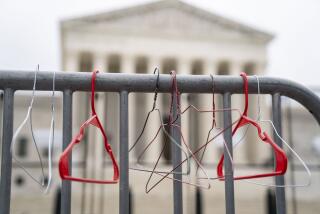Op-Ed: The Supreme Court may hand an enduring advantage to the Republican Party this term
“The Supreme Court,” columnist Finley Peter Dunne observed a century ago, “follows the elections.” Today’s Supreme Court appears on the verge of determining elections — in the Republican Party’s favor.
Three cases under consideration this term, and a fourth that is sure to come before the court either later this term or next, could well tilt elections in the GOP’s favor.
In the first of those cases, Janus vs. American Federation of State, County and Municipal Employees, the court has been asked to overturn a 40-year-old precedent, the Abood decision. A finding for Janus would mean public employee unions have no right to collect partial dues from nonmembers whom they are nonetheless legally obligated to represent in dealings with management. (Nonmembers are already permitted to withhold the portion of their dues that goes to the unions’ political activities.)
In the second and third cases, which are challenges to gerrymandering in Wisconsin and Maryland, the court has been asked to sustain or overturn the hyper-partisan creation of districts by state legislatures.
The fourth case that will doubtless appear on the court’s docket in coming months arises from the challenges that California Atty. Gen. Xavier Becerra and a group of 12 other state attorneys general have lodged against the U.S. Census Bureau for its decision to require respondents to the 2020 census to state whether or not they’re citizens.
While each of these cases raises a host of legal issues, they all are fundamentally about the partisan balance of power.
If, as expected, the five Republican appointees on the court rule for the plaintiff in Janus (the plaintiff is an Illinois state worker named Mark Janus), public employee unions will be decimated. That at least some of the GOP justices dislike such unions was clear from Justice Anthony M. Kennedy’s remarks during oral arguments in the case. The problem with those unions, Kennedy said, is that they advocate “for a greater size workforce, against privatization, against merit promotion, for teacher tenure, for higher wages, for massive government, for increasing bonded indebtedness, for increasing taxes.” Kennedy’s rant constituted a political condemnation of public sector unions; it didn’t touch on any legal issues.
The court’s GOP contingents may not amount to much as defenders of democracy and majority rule, but they’ve been powerful champions of Republican rule.
A pro-Janus ruling by the GOP Gang of Five — when added to the Republican justices’ decision in Citizens United, which overturned precedent to permit corporate campaign contributions — would amount to a new body of law that plainly favors capital over labor. More immediately, because deciding for Janus would greatly reduce the resources that public employee unions collect in general, it would also reduce what the unions spend on politics and elections — which, given the GOP’s profoundly anti-union animus, generally goes to Democratic campaigns.
Indeed, public employee unions are a linchpin of Democratic political efforts, playing a key role in mobilizing minority voters and funding other progressive organizations. Like Citizens United, Janus could give an enduring assist to the Republicans’ electoral prospects. Such a ruling could well be labeled Son of Bush vs. Gore.
Other such “sons” stand in the wings. Confronted with large-scale gerrymandering of congressional and legislative districts following the 2010 elections, and with evidence of the data-driven precision that now enables statehouses to indulge in such partisan line-drawing, Justice Samuel A. Alito Jr. nonetheless demonstrated his horror, in oral arguments last week, at any efforts to curtail such efforts. “I really don’t see how any legislature will ever be able to redistrict,” he said, if the court were to suggest any guidelines for fair representation. Because so many state governments are in Republican hands, the extremes of partisan gerrymandering are mostly on the GOP side, though the Maryland case concerns a Democratic gerrymander.
The Trump administration’s creation of a citizenship question on the 2020 census will confront the court with yet another partisan test. In an era of anti-immigrant fervor, the question will doubtless compel thousands, perhaps millions, of the foreign born, with or without documents, to avoid participating in the census. That would thereby inaccurately over-represent whites and the population of rural areas — in both cases, preponderantly Republican — in the next round of congressional reapportionment. In a nation growing more racially diverse and in which millennials are disproportionately liberal, one way the GOP can retain power is by decreasing representation from diverse, urban areas though population undercount.
The Republicans’ long-term strategy is clear in all three of these areas — dismantling Democrats’ political infrastructure by weakening unions, suppressing Democratic votes through gerrymander, and undercounting Democrat constituencies to lessen their impact in the House of Representatives. It won’t work, however, unless their men on the court opt to enshrine those stratagems as constitutional.
To date, the GOP justices and their recent predecessors have cooperated fully: They weakened the Voting Rights Act that protects minority voters; Alito literally asked for a challenge to Abood in one of his opinions; they strengthened the political speech of wealthy corporations and the donor class over ordinary Americans in Citizens United; not to mention what happened in 2000 when they made George W. Bush president.
The court’s GOP contingents may not amount to much as defenders of democracy and majority rule, but they’ve been powerful champions of Republican rule — a status that this year’s rulings may well, and disastrously, confirm.
Harold Meyerson is executive editor of the American Prospect. He is a contributing writer to Opinion.
Follow the Opinion section on Twitter @latimesopinionand Facebook
More to Read
A cure for the common opinion
Get thought-provoking perspectives with our weekly newsletter.
You may occasionally receive promotional content from the Los Angeles Times.






